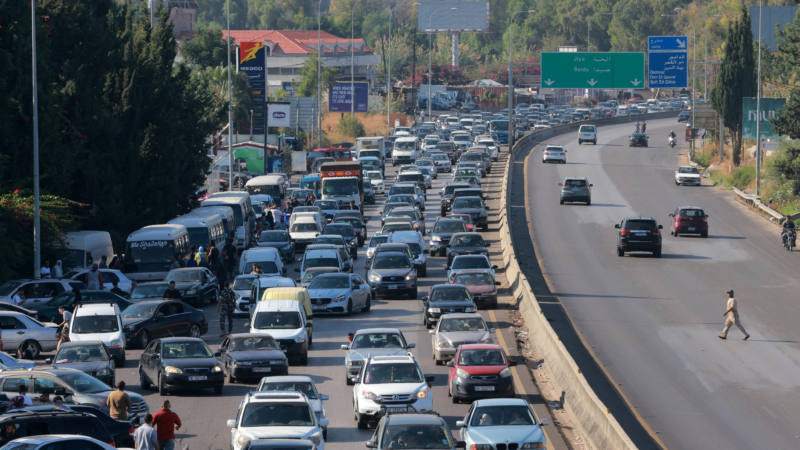Israel and Hezbollah continue to trade fire as residents in Lebanon look for safety
Israeli forces and Hezbollah have continued to trade cross-border missiles through the night and into Tuesday morning, following the deadliest day of airstrikes in the country for almost two decades.
Overnight, the Israeli military said that it initiated airstrikes alongside tank and artillery fire on Hezbollah targets in southern Lebanon.
Hezbollah announced early Tuesday it had fired dozens of rockets into northern Israel, aimed at several military installations, an airbase and a munitions factory.
Israeli authorities say a regional hospital was damaged as sirens sounded throughout large swathes of northern Israel. The Israeli missile interception batteries forced some of the rockets down, the Israeli military said, but several buildings were damaged and firefighting crews were working to extinguish blazes that resulted.
Elsewhere, Israeli strikes in Gaza’s southern city of Khan Younis early Tuesday killed at least seven, Palestinian officials said.
And in an interview with CNN, Iranian President Masoud Pezeshkian warned that the Israeli strikes risk pushing the region into wider conflict. “We must not allow for Lebanon to become another Gaza at the hands of Israel,” Pezeshkian said in the CNN report.
On Monday, Hezbollah fired roughly 100 missiles, some of them deep into Israel and around the northern city of Haifa, were largely intercepted and Israeli emergency services only reported a handful of injuries.
The vast majority of the nearly 500 people killed on Monday were in the south of Lebanon, according to the Lebanese Health Ministry, in a region where the militant group Hezbollah has initiated many of its cross-border attacks on targets inside Israel since October 7th.
More than 1,600 Lebanese were wounded, the health ministry added, as thousands more fled their homes and headed northwards away villages, towns and cities in that border region.
On a four-lane highway with two lanes of traffic usually passing in both directions, all four lanes were filled with escaping cars and buses, crammed with passengers. Children sat atop some vehicles or were crammed into the back of vegetable trucks, with some men sitting in the trunk of a car as Lebanese soldiers waved them through.
Residents from southern Lebanon described being told to leave their homes in anonymous phone calls. “Please leave all your work and go outside,” Bilal Hemadi said he was told by someone speaking in broken Arabic on an Israeli phone number that called his home’s landline number. The businessman, who lives in a border village called Nabatieh, said he responded, “‘OK, thank you,'” and with his wife and three children he soon headed north to Beirut, where he will shelter with friends.
With little notice, many of the thousands fleeing had little time to pack belongings, and not all were sure in conversations where they would go.
One of Hezbollah’s most senior commanders told people mourning at a funeral in Beirut this past weekend that this conflict now represented an open-ended war, while the Israeli military has said it will not rule out a ground invasion across the border into Lebanon’s territory.
This latest escalation in cross border violence follows the thousands of unexpected pager and walkie-talkie explosions that left members and allies of Hezbollah dead or severely wounded. Civilians, including children, were also injured or killed during those explosions across Lebanon, and soon after an airstrike Friday in the Lebanese capital killed dozens of other civilians, including children, as well as Hezbollah fighters and the senior commander of the group that the Israeli military said it had targeted.
In a video released Monday, Israeli prime minister Benjamin Netanyahu warned people in Lebanon that Hezbollah – which is considered a terrorist organization in several nations, including the United States – was endangering them and they should leave areas close to the border in the country’s south and east.
“Please get out of harm’s way now,” Netanyahu said in the message. “Once our operation is finished, you can come back safely to your homes.” In certain border regions the extent of the destruction from Israeli airstrikes means some residents no longer have homes to which they can return.
A boy snatched from a California park in 1951 is found living on the East Coast
Luis Armando Albino was lured away from a California park at the age of 6. He reunited with his biological family this summer after his niece found him through DNA testing and newspaper clippings.
Poll: Mass. voters split on psychedelics, tipped wages, but support auditing the Legislature
Massachusetts voters are juggling a lot of questions on this year's ballot. And if a new WBUR poll is any indicator, things are still very much up in the air.
How Trump and Vance’s tour of dude influencers might help them win
Donald Trump has spent the last several months speaking with popular male influencers and podcasters like Logan Paul and Theo Von. The appearances are part of a strategy to turn out young men.
ExxonMobil sued over plastic pollution. And, nearly 500 killed in Israeli strikes
California is suing ExxonMobil for allegedly misleading the public for decades about the recyclability of plastic. And, Israeli strikes in Lebanon yesterday left nearly 500 people dead.
Have economists gone out of fashion in Washington?
Once the high priests of policy, economists may now be seeing lower demand. But who's taking their place?
New York City has a rat problem. Officials have a plan to kick it from the curb
New York City has a well known rat problem. And the city is trying to tackle it — with trash cans and by changing human behavior.




